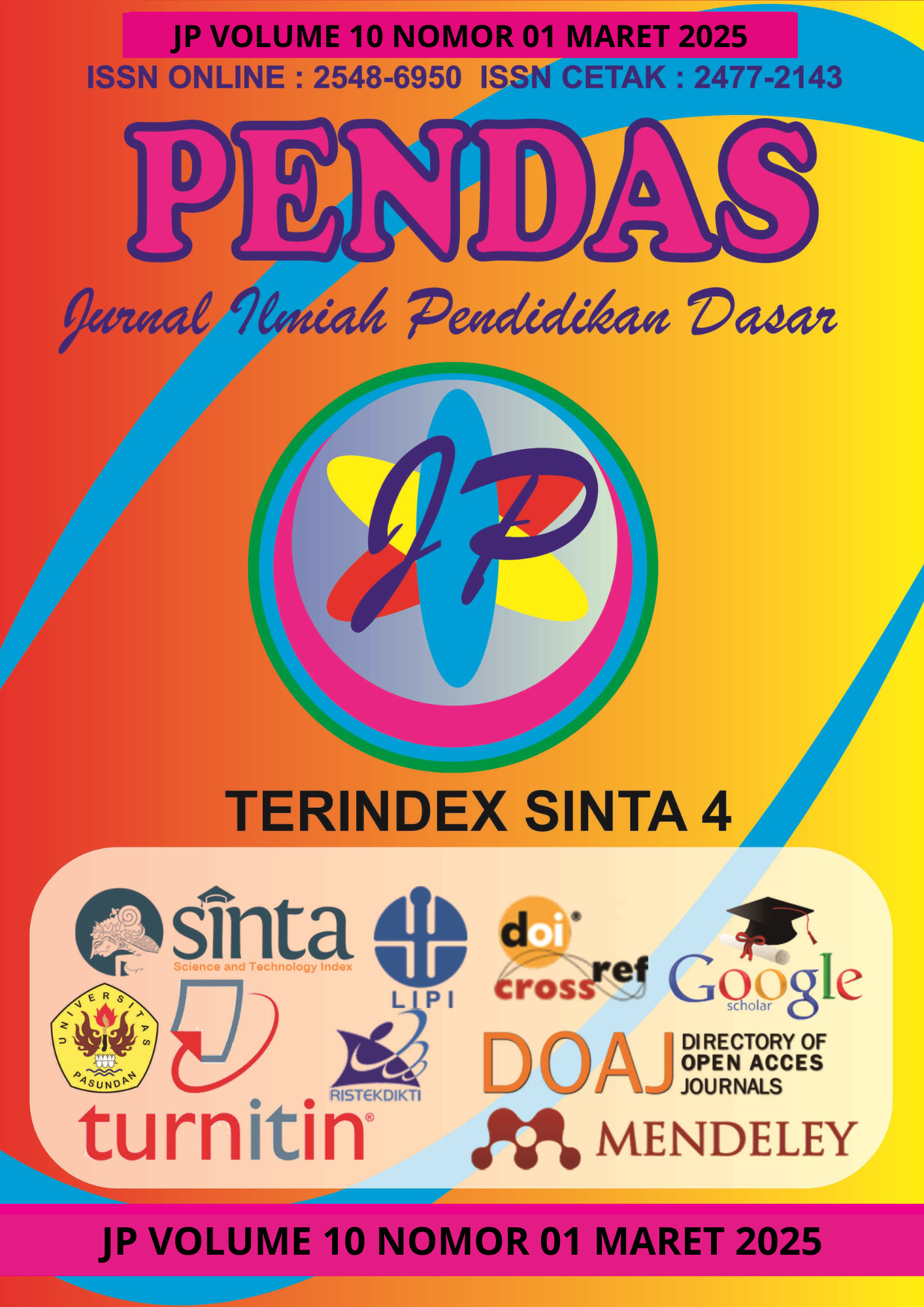PENGARUH SERVANT LEADERSHIP DAN WORKPLACE SPIRITUALITY TERHADAP TURNOVER INTENTION GURU DI SEKOLAH XYZ BATAM MELALUI ORGANIZATIONAL CITIZENSHIP BEHAVIOR SEBAGAI VARIABEL MEDIASI
DOI:
https://doi.org/10.23969/jp.v10i01.22810Keywords:
Servant leadership, workplace spirituality, turnover intention, organizational citizenship behavior, teacherAbstract
The high turnover rate among teachers can negatively impact the quality of education in schools. Servant leadership and workplace spirituality are considered important factors that can enhance teachers' commitment and job satisfaction, thereby potentially reducing their intention to leave the organization. Additionally, organizational citizenship behavior (OCB) is thought to strengthen the relationship between servant leadership and workplace spirituality in the workplace, fostering an intention to remain with the organization. This study aims to determine whether servant leadership and workplace spirituality influence teachers' turnover intention and to explore the mediating role of OCB in this relationship. Data were collected through a survey by distributing questionnaires to 74 teachers at XYZ School in Batam and analyzed using Partial Least Squares Structural Equation Modeling (PLS-SEM). The results indicate that servant leadership and workplace spirituality have a positive influence on OCB but servant leadership do not directly affect turnover intention. Contrarily, workplace spirituality was found to have a negative impact on turnover intention. OCB does not mediate between servant leadership, workplace spirituality, and turnover intention.
Downloads
References
Achen, R. M., Dodd, R., Lumpkin, A., & Plunkett, K. (2019). Servant as leader: The effects of servant-leaders on trust, job satisfaction, and turnover intentions in intercollegiate athletics. Servant Leadership: Theory & Practice, 6(1), 13-36.
Ali Yusuf, F., & Widodo, W. (2023). The secret of reducing turnover intention: Evidence from Indonesia. Cogent Business & Management, 10(2), 1-20. https://doi.org/10.1080/23311975.2023.2202026.
Badan Pusat Statistik. (2023). “Statistik Pendidikan 2023.” Badan Pusat Statistik. Diakses tanggal 5 Oktober 2024. https://www.bps.go.id/id/publication/2022/11/25/a80bdf8c85bc28a4e6566661/statistik-pendidikan-2022.html.
Banata, A., Pandjaitan, N. K., & Ramly, A. T. (2023). Teachers Turnover Intention: The Role Of Work Motivation, Job Stress, And Organisational Commitment. International Journal of Social Service and Research, 3(11), 2931-2941. https://doi.org/10.46799/ijssr.v3i11.587.
Bismala, L., Hafsah, H., Handayani, S., & Indari, A. (2024). Workplace Spirituality and Organization Citizenship Behavior (OCB): Employee Engagement Mediation. Jurnal Pendidikan Progresif, 14(1), 263-278. http://dx.doi.org/10.23960/jpp.v14.i1.202420.
Brohi, N. A., Khuhro, M. A., Shah, I. A., & Hussain, A. (2021). I am of value to the organization: The Role of Servant Leadership in Predicting Psychological Capital and Turnover Intention among School Teachers in Pakistan. Ilkogretim Online, 20(5), 5344-5360.
Charzyńska, E., Polewczyk, I., Góźdź, J., Kitlińska-Król, M., & Sitko-Dominik, M. (2021). The buffering effect of spirituality at work on the mediated relationship between job demands and turnover intention among teachers. Religions, 12(9), 781. https://doi.org/10.3390/rel12090781
De Geus, C. J., Ingrams, A., Tummers, L., & Pandey, S. K. (2020). Organizational citizenship behavior in the public sector: A systematic literature review and future research agenda. Public Administration Review, 80(2), 259-270. https://doi.org/10.1111/puar.13141.
Garson, G. D. (2016). Partial least squares. Regression and structural equation models. Asheboro: Statistical Associates Publishing.
Glassow, L. N. (2024). Inequitable teacher turnover and performance-based appraisal: a global trend?. Journal of Education Policy, 39(2), 276-302. https://doi.org/10.1080/02680939.2023.2189753.
Gunawan, R. M., & Widodo, W. (2021). Linking quality of work-life to turnover intention: The role of organizational citizenship behavior. Jurnal Konseling dan Pendidikan, 9(4), 358-365. https://doi.org/10.29210/169600
Hair, J. F., Risher, J. J., Sarstedt, M., & Ringle, C. M. (2019). When to use and how to report the results of PLS-SEM. European business review, 31(1), 2-24. https://doi.org/10.1108/EBR-11-2018-0203
Hair, J. F., Sarstedt, M., & Ringle, C. M. (2021). Partial least squares structural equation modeling. In Handbook of market research (pp. 587-632). Switzerland: Springer International Publishing.
Hauff, S., Richter, N. F., Sarstedt, M., & Ringle, C. M. (2024). Importance and performance in PLS-SEM and NCA: Introducing the combined importance-performance map analysis (cIPMA). Journal of Retailing and Consumer Services, 78, 1-14. https://doi.org/10.1016/j.jretconser.2024.103723.
Husnani, H., Zaibi, Z., & Rollies, B. (2019). Tantangan Guru di Era Kekinian. Prosiding Seminar Nasional Pendidikan Program Pascasarjana Universitas PGRI Palembang, 348–356.
Juliandi, Azuar. (2018). “Structural equation model based partial least square (SEM-PLS): Menggunakan SmartPLS.” Pelatihan SEM-PLS Program Pascasarjana Universitas Batam. Batam: Universitas Batam. https://doi.org/10.5281/zenodo.2532119.
Organ, D. W., Podsakoff, P. M., & MacKenzie, S. B. (2005). Organizational citizenship behavior: Its nature, antecedents, and consequences. Sage publications.
Pujiastri, R., & Negoro, D. A. (2023). The role of quality of work life on job stress and turnover intention mediated by job satisfaction of private teachers in tangerang district. Jurnal Manajemen Indonesia, 23(2), 176-184.
Qi, L. E., & Awang, M. M. (2024). A Study of Social Environmental Support and Turnover Intention among Rural Primary School Teachers in China. International Journal of Academic Research in Business and Social Sciences, 14(1): 856-865. http://dx.doi.org/10.6007/IJARBSS/v14-i1/19818.
Saraih, U. N., Aris, A. Z. Z., Karim, K. M., Samah, I. H. A., Sa'aban, S., & Mutalib, S. A. (2017). Relationships between organizational commitment, OCB, organizational justice and turnover intention: Evidence from educational institution in Malaysia. Review of Integrative Business and Economics Research, 6(2), 64-77.
Serrano-Quijano, E. J. (2020). Servant leadership and organizational citizenship behavior of school heads. International Journal of New Economics and Social Sciences IJONESS, 12(2), 153-180. https://doi.org/10.5604/01.3001.0014.6890.
Shaheen, A., & Rashidi, Z. (2021). Workplace Spirituality, Emotions and Turnover Intentions. International Journal of Innovation, Creativity and Change, 15(3), 1075-1090.
Sugiyono. (2022). Metode Penelitian Kuantitatif, Kualitatif, dan R&D. Bandung: Alfabeta.
Downloads
Published
Issue
Section
License
Copyright (c) 2025 Pendas : Jurnal Ilmiah Pendidikan Dasar

This work is licensed under a Creative Commons Attribution 4.0 International License.














































